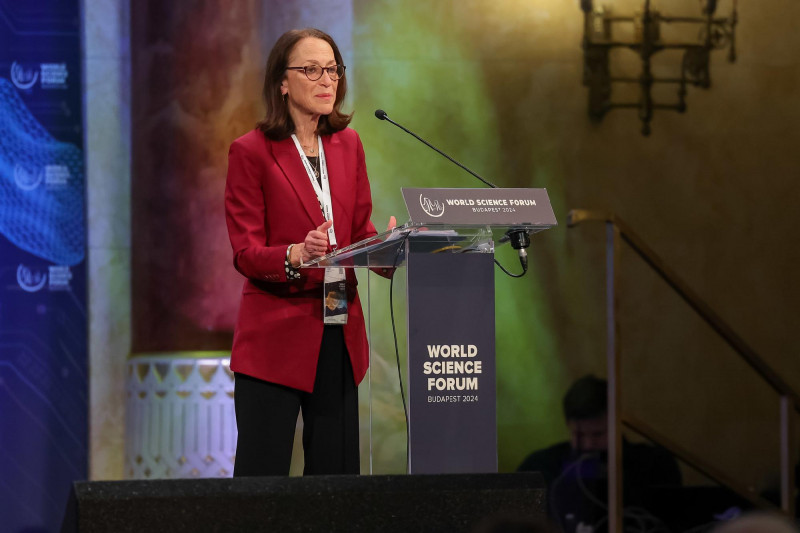“It is a time of reckoning for the scientific community” – Interview with Dr Margaret Hamburg
In a world shaped by rapid scientific and technological advancements, the challenges of integrating these breakthroughs into society’s consciousness are immense. At the recent 2024 World Science Forum (WSF), Dr Margaret Hamburg, Co-President of the InterAcademy Partnership (IAP), sat down to talk with the WSF about the panel she participated in on “Risk Assessment – Weighing Risk in Policymaking” and her views on policymaking. Her perspectives underscore the interplay between science, policymaking and public trust, and how we can become more resilient in the face of today’s global challenges.
Dr Hamburg began by highlighting the dual nature of today’s scientific landscape. While groundbreaking innovations such as artificial intelligence and medical advances offer unprecedented opportunities, they also raise critical societal and ethical questions. We live in a time where science sometimes feels like “it’s moving at a pace that perhaps society can’t quite keep up with in terms of its implications,” she remarked. This gap, coupled with pressing issues such as climate change, demands a balanced approach to weighing risks and benefits.
At the heart of these discussions is the need for collaboration. Dr Hamburg stressed the importance of defining the roles of governments, industries and researchers to ensure that progress is harnessed responsibly. However, achieving this in an ideologically polarised world – with competing priorities and growing distrust in scientific expertise – requires conscious efforts to build bridges.

A notable realisation for Dr Hamburg in the plenary session was the universal complexity of these issues. Countries across the spectrum of economic development face similar dilemmas in managing scientific risks and benefits. This shared challenge calls for a collective effort from the global scientific community. We need “to expand our thinking about how best to communicate on some of these issues, how best to engage policymakers and the public, and how best to really be mindful of the important broader context in which scientific advances and capabilities have to be implemented,” she noted. Such communication efforts are essential not only for the dissemination of knowledge, but also for fostering public understanding and trust in science.
Through her role at the IAP, Dr Hamburg is deeply involved in initiatives to bridge the gap between science and policymaking. The IAP works with over 150 academies worldwide to provide science-based advice and to generate evidence for sound policy decisions. A significant part of this mission is enhancing science education to equip individuals with the tools to navigate a complex, technology-driven world. “Understanding science – how it’s done and its important applications – will be crucial for anyone living in the modern world,” noted Dr Hamburg. Beyond education, the IAP is undertaking targeted studies in areas such as climate change, food security and decarbonisation, offering actionable recommendations to policymakers. These efforts underscore the value of multidisciplinary approaches in addressing global challenges.
One of the most pressing issues highlighted by Dr Hamburg is the erosion of public trust in science and institutions. This distrust, fuelled by misinformation and societal polarisation, poses a significant barrier to progress. To address it, the scientific community needs to re-evaluate how it engages with the public. “It is a time of reckoning for the scientific community: how can we be more effective at demonstrating our value to society and solving the great challenges before us?” she asked. For Dr Hamburg, restoring trust involves both explaining the scientific process and listening to public concerns. She believes that scientists must demonstrate the relevance of their work in everyday life and crises while also rethinking how and by whom messages are delivered.
Speaking further about the IAP, its Co-President said that its initiatives go beyond traditional scientific domains, addressing systemic issues such as gender inequality in academia and exploring new fields such as urban health. Dr Hamburg mentioned an ongoing study focused on supporting women in science, a vital step towards achieving full representation in academia. Here, “changing the culture is key,” she explained. She also highlighted that the IAP’s work on urban health reflects the intersection of diverse disciplines such as engineering, public health and urban planning, areas necessary to tackle challenges in rapidly growing cities.
Dr Hamburg’s reflections at the WSF serve as a call to action for the scientific and policymaking communities. Whether tackling climate change, ensuring food and energy security, or restoring trust in institutions, the need for collaboration and effective communication is paramount. As she put it, “We need to harness the extraordinary advances in science and technology for the benefit of humanity and the future of our globe.” She emphasised the power of collective action to address the complex challenges of our time and through initiatives such as those spearheaded by the IAP. The hope is to create a world where science serves as a cornerstone of informed and equitable decision-making.